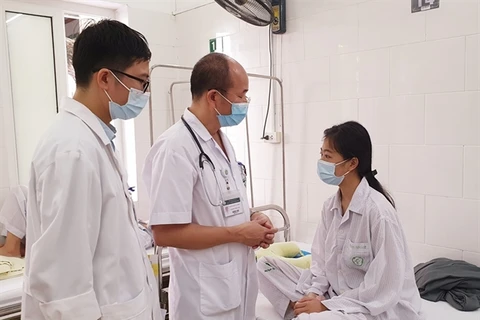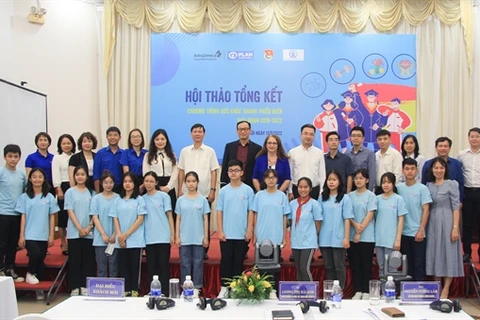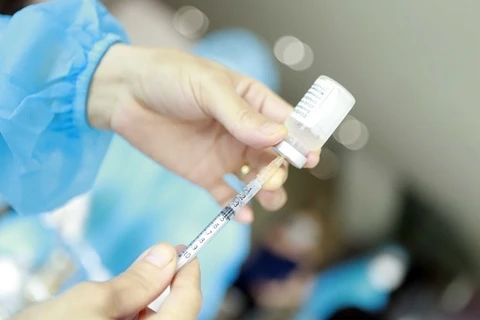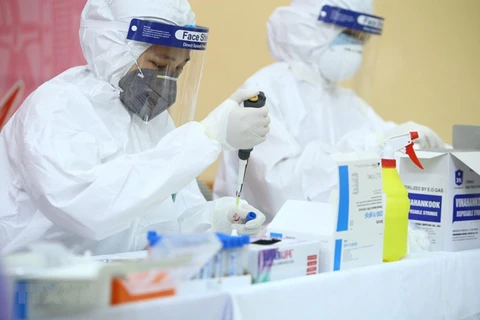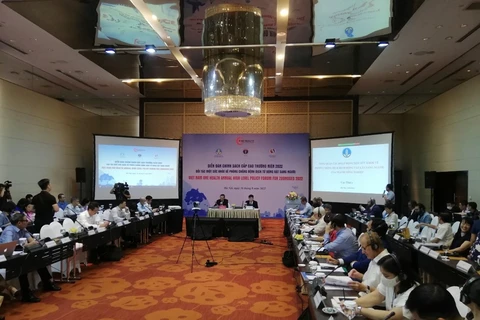Hanoi (VNS/VNA) - Almost half of adults living in urban areas in Vietnam have high cholesterol levels caused by poor diet and lack of exercise.
The stark revelation came from President of Vietnam Medical Association Nguyen Thi Xuyen, who is also a former Deputy Minister of Health.
He says high cholesterol is becoming an alarming problem with many serious consequences.
Hyperlipidemia (high cholesterol) is an excess of lipids or fats in your blood. This can increase the risk of heart attacks and strokes because blood can’t flow through your arteries easily. Adding exercise and eating healthy foods can lower cholesterol although some people need medication as well.
Xuyen said: “People in Vietnam are still not equipped with the right knowledge about high cholesterol while the disease can be prevented and controlled through measures, particularly nutrition and exercise."
According to Assoc. Prof and Dr. Nguyen Quang Dung, Deputy Head of the Department of Nutrition and Food Safety of Hanoi Medical University high cholesterol is one of the main causes of atherosclerosis - the build-up of fats, cholesterol, and other substances in and on the artery walls.
Globally, one-third of heart attacks are caused by hypercholesterolemia.
In Vietnam, for every ten adults, there are three people with high cholesterol, accounting for 30%. The rate in urban areas is 44.3%. More than 50% of women 50-65 years old have hypercholesterolemia.
“Despite such serious consequences, people are still indifferent to increasing cholesterol as they consume a lot of fast food, fried, greasy food, eat fewer vegetables and fruits and do few physical activities,” he said.
Truong Hong Son, Deputy General Secretary of the Vietnam Medical Association, and Director of the Vietnam Institute of Applied Medicine said that in addition to treatment with drugs, the condition must be treated according to the cause.
Son said: “Currently changing the diet is the most important thing for patients. The change in diet is not about cutting out protein or starch, but having a reasonable diet.”
Son noted that Vietnamese people thought that to reduce cholesterol, it was necessary to completely remove fat from the diet.
“This is a misconception because fat is an essential group of substances that the body needs to supplement every day in a reasonable amount,” he added.
“Many of the world's healthy diets also emphasise that it is not necessary to completely remove fat from daily diets.
“Instead of eliminating fat, we need to select healthy fat sources to take into the body. Specifically, the use of fat sources from animal viscera, animal fat, fast food, canned food should be limited.”
Instead, it is necessary to increase the source of good fats that are commonly found in deep sea fish such as salmon, and herring, or those in avocados, olives, and vegetable oils such as brown rice oil, soybean oil, and sunflower oil.
Cooking oils containing Gamma-Oryzanol and Phytosterol nutrients should be preferred because they also can reduce cholesterol absorption from food.
He believes that in Vietnam, many doctors now often advise patients with high cholesterol not to eat eggs but dietetic associations in the UK, America, and Sweden had removed the cholesterol limit in eggs.
The American Heart Association also recommends that people with heart disease should eat five eggs per week.
"Previously, it was advised that children should not eat a lot of eggs but now, it was corrected that egg yolks including Iron, calcium, and vitamin D are very good for body development," Son said.
Besides nutrition, people are highly recommended not to smoke tobacco, not overindulge in alcoholic drinks and regularly take physical activities, about 30 minutes a day and at least five days a week./.
The stark revelation came from President of Vietnam Medical Association Nguyen Thi Xuyen, who is also a former Deputy Minister of Health.
He says high cholesterol is becoming an alarming problem with many serious consequences.
Hyperlipidemia (high cholesterol) is an excess of lipids or fats in your blood. This can increase the risk of heart attacks and strokes because blood can’t flow through your arteries easily. Adding exercise and eating healthy foods can lower cholesterol although some people need medication as well.
Xuyen said: “People in Vietnam are still not equipped with the right knowledge about high cholesterol while the disease can be prevented and controlled through measures, particularly nutrition and exercise."
According to Assoc. Prof and Dr. Nguyen Quang Dung, Deputy Head of the Department of Nutrition and Food Safety of Hanoi Medical University high cholesterol is one of the main causes of atherosclerosis - the build-up of fats, cholesterol, and other substances in and on the artery walls.
Globally, one-third of heart attacks are caused by hypercholesterolemia.
In Vietnam, for every ten adults, there are three people with high cholesterol, accounting for 30%. The rate in urban areas is 44.3%. More than 50% of women 50-65 years old have hypercholesterolemia.
“Despite such serious consequences, people are still indifferent to increasing cholesterol as they consume a lot of fast food, fried, greasy food, eat fewer vegetables and fruits and do few physical activities,” he said.
Truong Hong Son, Deputy General Secretary of the Vietnam Medical Association, and Director of the Vietnam Institute of Applied Medicine said that in addition to treatment with drugs, the condition must be treated according to the cause.
Son said: “Currently changing the diet is the most important thing for patients. The change in diet is not about cutting out protein or starch, but having a reasonable diet.”
Son noted that Vietnamese people thought that to reduce cholesterol, it was necessary to completely remove fat from the diet.
“This is a misconception because fat is an essential group of substances that the body needs to supplement every day in a reasonable amount,” he added.
“Many of the world's healthy diets also emphasise that it is not necessary to completely remove fat from daily diets.
“Instead of eliminating fat, we need to select healthy fat sources to take into the body. Specifically, the use of fat sources from animal viscera, animal fat, fast food, canned food should be limited.”
Instead, it is necessary to increase the source of good fats that are commonly found in deep sea fish such as salmon, and herring, or those in avocados, olives, and vegetable oils such as brown rice oil, soybean oil, and sunflower oil.
Cooking oils containing Gamma-Oryzanol and Phytosterol nutrients should be preferred because they also can reduce cholesterol absorption from food.
He believes that in Vietnam, many doctors now often advise patients with high cholesterol not to eat eggs but dietetic associations in the UK, America, and Sweden had removed the cholesterol limit in eggs.
The American Heart Association also recommends that people with heart disease should eat five eggs per week.
"Previously, it was advised that children should not eat a lot of eggs but now, it was corrected that egg yolks including Iron, calcium, and vitamin D are very good for body development," Son said.
Besides nutrition, people are highly recommended not to smoke tobacco, not overindulge in alcoholic drinks and regularly take physical activities, about 30 minutes a day and at least five days a week./.
VNA

